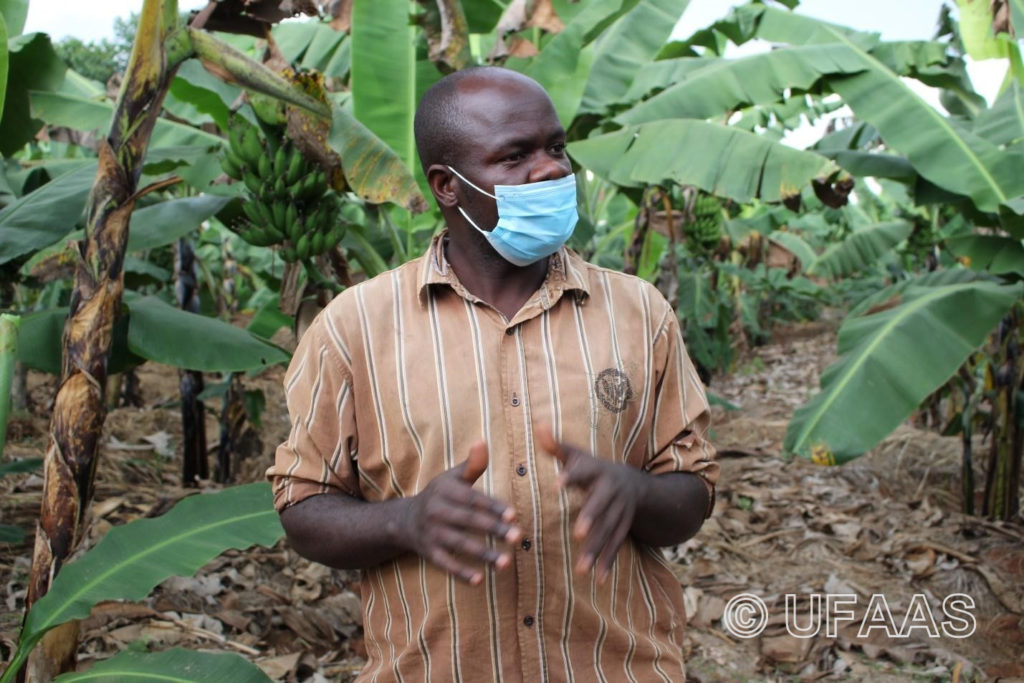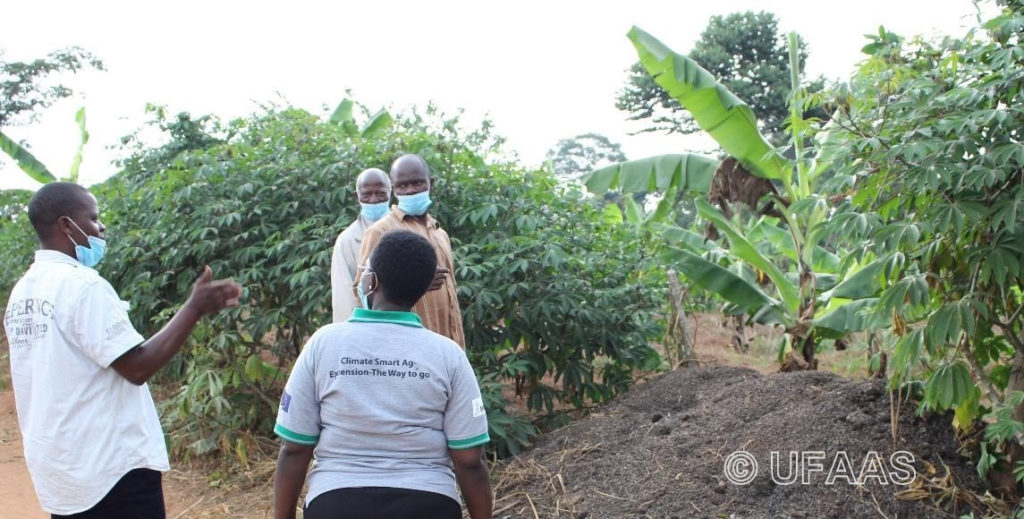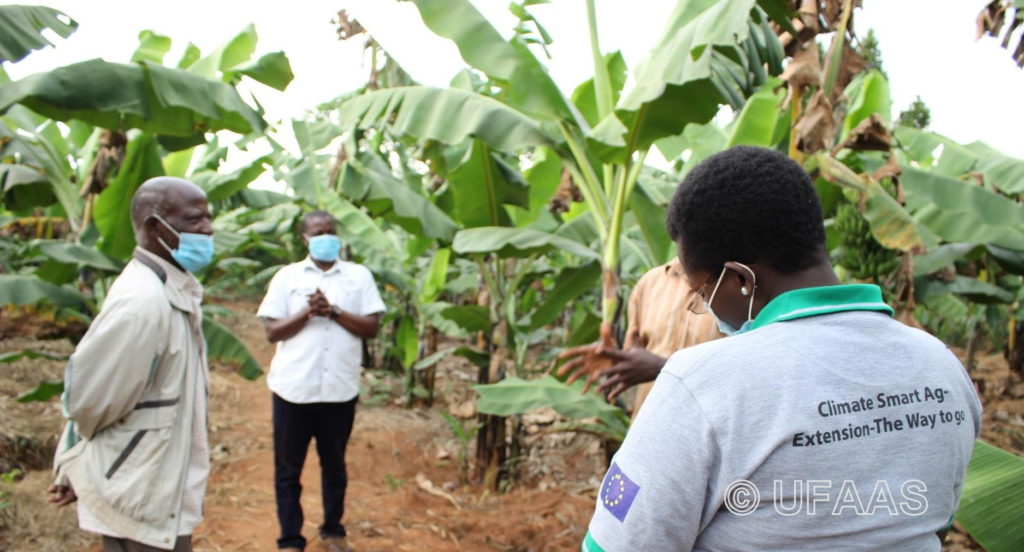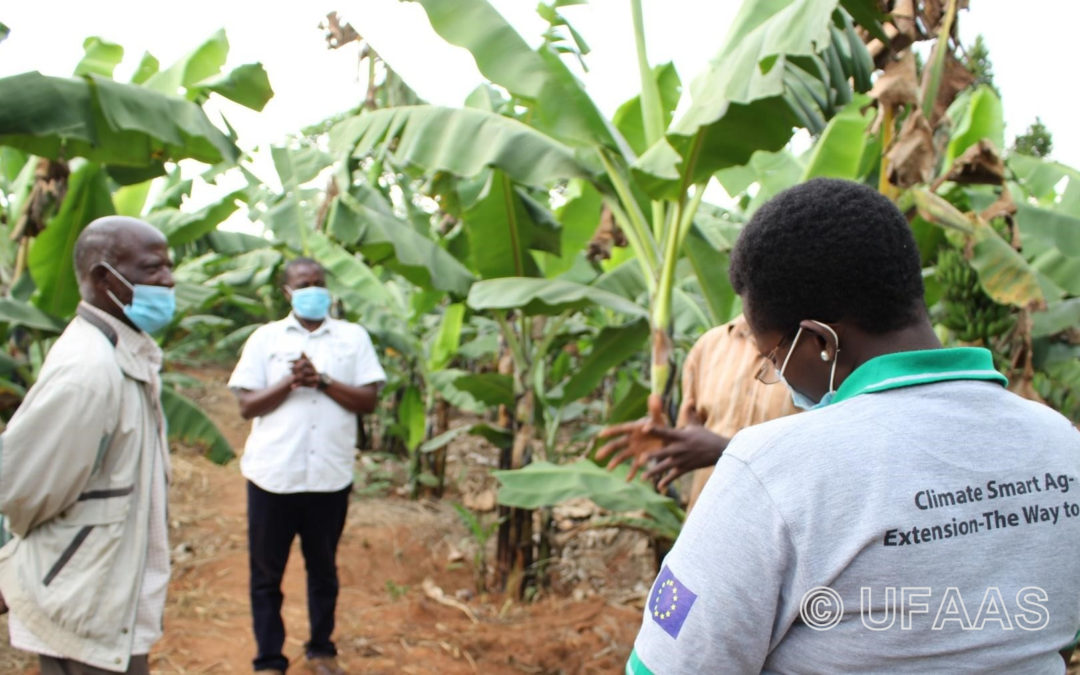Case 1: Climate Smart banana production brings cash, respect and creates opportunities for Farmers
Elias Mbidde is a member of the Zirobwe Agaliawamu Agribusiness Training Association (ZAABTA). Through a farmer exchange visit, Elias learned Climate Smart agriculture techniques to produce bananas.
He established a new plantation where he applied the learnt practices. He dug deeper planting holes to protect the roots, applied manure to improve fertility, used mulch to retain water in the soil, planted and reserved trees to provide leaf fall nutrients and act as windbreakers, and dug water bunds to collect runoff. These practices quickened the fruiting of the bananas (at 7-8 months), gave bigger bunches, and improved soil conditions. The status of his farm made him popular and a model farmer.
During the visit, Elias was happy to share his story and praise for the source of climate smart agriculture knowledge he got. He said: “Every time I pray, I ask God to bless Nehemiah who was willing to share with me knowledge of producing bananas amidst harsh weather conditions, and ZAABTA which organized the visit. I am now a respected man in this village, and I even have rich friends who come to me requesting to visit my farm”.
Mr Mbidde Elias lives with his wife and three children in Nakaseta village, Kyetume Parish, Zirobwe Sub-County, Luweero District in Central Uganda. A member of Zirobwe Agaliawamu Agribusiness Training Association (ZAABTA) a producer organization, Elias practices mixed farming with two cows, three goats, 3 hens. Like many farmers in Nakaseta, Elias’s farming was severely affected by adverse weather conditions, and he lacked knowledge on how to deal with them. Most people thought the soil in the area was not conducive for banana production. Typically, the bunches were very small, the fruiting would take longer, stools would rise to the soil surface, and the plantations in the area would die out in less than 6 years.
This inadequate knowledge about banana production is partly responsible for low yields. Despite being the staple food in the area, productivity was very low.

The game changer:
Through farmer exchange visits organized by ZAABTA, Elias visited Nehemiah Buwule, a youth model farmer in Bungo village (6 kilometers away from his home) and saw bananas looking healthy and expressed interest in learning. Nehemiah was one of the farmers that benefited from the Climate Smart Agriculture project implemented by ZAABTA.
Elias said: “When I saw the banana plantation I said to myself: I am not lame, I have two hands, two legs and a brain, why can’t I have a plantation like this? That night, I did not sleep. I spent the whole night thinking how I can go about having a banana plantation as healthy as what I saw at Nehemiah’s”.
Good CSA practices
Elias learnt practices to establish a banana plantation-digging deeper planting holes, using heavy mulch, applying manure, minimum tillage, planting/retaining specific shade trees in the garden, and digging water bunds.

With little savings from his bricklaying business, Elias mobilized labor from the ZAABTA production support group to undertake the initial activity- digging holes. The plantation sits on four acres of banana and a total of 1600 stools. The deep holes, applied organic manure, mulch and trough strengthen resilience to climatic shocks such as running water, wind, while the trees act as wind breakers as well as reducing greenhouse gas emissions. He noticed his banana plants started fruiting at 7-8 months compared to the 12-15 months which was the average time in the area. In addition, the plantation is ever-green whether in dry spells or rainy season unlike other plantations in the area which dry up during the dry seasons.

To expose Elias to more practices and training, ZAABTA enrolled him in the Climate Smart Agriculture project. With a healthy plantation set up in a place where some neighbors even entered betted that bananas cannot thrive, he became popular and is sought after by more than 20 farmers to provide the same services and to speak to people. However, some neighbors have not yet adopted the practices.
When the UFAAS team visited Elias, he could not hide his gratitude:
“I am very happy that I have come this far in life. Some people in this villages used to think that I have witchcraft for my banana plantation to look good. There is no witchcraft here. The mulch I use keeps the water in the soils for a longer period, and the holes are so deep that we don’t cut the banana roots. This mulch […pointing at the mulch] also saves labor. If there was no mulch, I would need about 6 people to weed the plantation for about a week, but now, I just come with my wife to pluck out the few weeds and we go back home. In fact, our gumboots do not become dirty because we don’t step directly on the soil. People who meet us on the way do not believe that we are from the garden because were are not very dirty”.
“…Every time I pray, I ask God to bless Nehemiah who was willing to share with me knowledge of producing bananas amidst harsh weather conditions, and ZAABTA which organized the visit. I am now a respected man in this village, and I even have rich friends who come to me requesting to visit my farm”.
Elias appeals to people especially the youth to abandon bad vices that keep them off the farm and engage in farming while harnessing the God and nature given gifts of rainfall, sunshine and vegetation. He also advised them to start with what they have and expand in due course but not wait to get big land. “We have many God-given resources. Soil is free, rainfall is free. All these are gold mines if handled well. While my piece of land is big, you can start small. I am telling you, this grass I use for mulching does not come from Europe. We have it in this community and all you need is to be focused” Mr Elias concluded.
Scaling climate smart technologies beyond the Mbidde family
After several months of consistently better practices, with climate-smart agriculture options, the Mbidde family has become a model within the community. He provides services for banana plantation set up and management. On average, he demonstrates climate-smart practices to peers during field days, over 50 people attend.

Elias possesses the knowledge and skills to train other farmers who reach out to him even after the CSA related projects at ZAABTA close thus promoting continuity and diffusion of CSA innovations in banana production. The CSA principles are replicated to other crops such as row planting and minimum tillage in maize, agro-forestry among others thus contributing to resilient agricultural systems.
While he hasn’t yet sold many bunches, Elias is optimistic that adopting climate-smart agriculture practices gives high yields, and benefits him beyond food. The plantation has made him popular, and he has used proceeds from the farm and advisory services to mobilise more mulch, pay school fees for his children, and buy DSTV. He is very confident that his family will always produce well on healthy soil, and that they will apply all the technologies learned in various aspects of farming for increased production and productivity at his farm, resilience to climatic shocks and variability, and reduction of greenhouse emissions.
What others say about Mr Mbidde:
Mr Jasper Kiiza commended Elias on the smart work and for putting what he learnt into practice. “Unlike us who started by trial and error, it is good that Elias has role models and places where to copy good practices and do the same at his farm”..
Mr Mayambala Godfrey the ZAABTA manager also praised Mr Mbidde: “Elias is one person who is keen and willing to earn. I am happy that he is doing much better”. remarked Mayambala.

More photos about the Mbidde’s CSA practices can be seen in the link here and a video here
Story by Elizabeth Asiimwe

